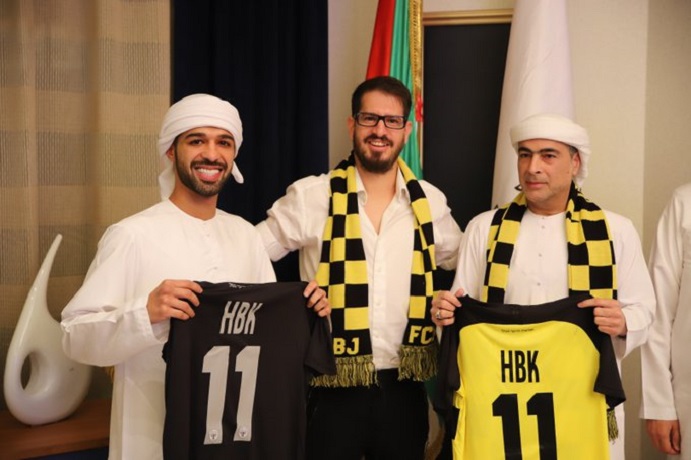Tamara Nassar
The Electronic Intifada / December 10, 2020
A member of the Abu Dhabi royal family has purchased a nearly 50 percent stake in Beitar Jerusalem, Israel’s most notoriously racist football club.
The club announced the sale on Monday after it was finalized between Hamad Bin Khalifa Al Nahyan and his now co-owner Moshe Hogeg.
The club called it a “historic and exciting day.”
The Emirati royal has pledged to invest more than $90 million over the next decade, which the club said will be used for infrastructure and recruiting players, among other things.
The club will form a new board of directors that will include Hamad Bin Khalifa’s son, Muhammad Bin Hamad Al Nahyan, who will be his father’s representative.
Hamad Bin Khalifa said he was “thrilled to be a partner in such a glorious club,” and in Jerusalem, no less, which he called “the capital of Israel and one of the holiest cities in the world.”
History of racism
What the Emirati royal describes as “glorious” is a club whose fans are infamous for their anti-Palestinian rampages, habitually accompanied by chants of “Death to the Arabs.”
And that’s precisely what Hamad Bin Khalifa got for his troubles.
Fans welcomed the club’s new co-owner by painting “Fuck Dubai” on the wall of the club’s stadium.
Other racist slogans daubed on the walls included “Death to the Arabs” and phrases denigrating the Prophet Muhammad.
Beitar Jerusalem has been reprimanded and penalized in the past for the ultra-racism of its fans.
It remains the only “top flight” Israeli club never to have hired a single Palestinian citizen of Israel.
When the club did sign non-Arab Muslim players, they left after just a short time due to racist harassment.
Still, the club has historically enjoyed the following of prominent Israeli figures, including Prime Minister Benjamin Netanyahu, and of Elor Azarya, the army medic who became a national hero after executing incapacitated Palestinian Abd al-Fattah Yusri al-Sharif in the occupied West Bank in 2016.
Israel’s transportation minister Miri Regev previously posted a video of herself during her time as culture minister, surrounded by Beitar fans shouting genocidal slogans against Palestinians, including, “May your village be burned.”
Cosmetic change
“We all march together to new days of coexistence, achievement and brotherhood for the sake of our club and community and for Israeli sports,” said Moshe Hogeg, the Israeli tycoon who bought the club in 2018 on a mission to whitewash its image.
Hamad Bin Khalifa said he has “heard a lot about the changes taking place in the club” and said he was happy to be part of it.
The Emirati royal also said the doors of the club are “open to anyone, for any talented player, no matter where he is from or what his religion is.”
The signing of the co-ownership agreement has been dressed up with the same language of “peace” and “coexistence” used in the normalization deal between Israel and the United Arab Emirates.
But such declarations only serve as a fig leaf for normalization deals meant to liquidate Palestinian rights.
Now, the pair, who had previously been described as friends, co-own the club.
After buying the club, Hogeg remarked in 2019 that “the reputation was very, very bad and that was one of the reasons I decided to take the challenge.”
But changes have only been that – reputational.
The most radical change that Hogeg managed was to recruit Ali Mohamed, a footballer from Niger who notwithstanding his typically Muslim name is a devout Christian.
Upon his signing, Beitar Jerusalem’s notorious fan organization known as La Familia said they had “no problem whatsoever” with Mohamed “since he is a devout Christian,” but that they did have a problem with his name.
“We will make sure that his name is changed so that the name Mohamed is not heard at [Beitar’s] Teddy Stadium.”
Supporter of normalization
Hamad Bin Khalifa has been an active supporter of normalization with Israel.
In October, he threw a lavish birthday party for Israeli-American pop star Omer Adam in Dubai.
A company that Bin Khalifa chairs also signed a deal with Israeli corporation Sure Universal to create a joint product.
Settlement products
Meanwhile, the United Arab Emirates agreed to begin importing products from Israeli settlements.
Emirati company FAM Holding signed a $1 billion agreement on Monday to import honey, wine, tahini and other products from companies based in settlements.
The settlements involved in the deal – Itamar, Rehelim and Hermesh – lie in the northern occupied West Bank.
Alongside other European settler-colonies, Israel has long sought to sell wines produced on stolen Palestinian and Syrian land in the global wine market, as Columbia University professor Joseph Massad recently wrote.
Yossi Dagan, head of the Samaria Regional Council, a settler body in the northern occupied West Bank, signed the agreement with Faisal Ali Musa, the head of the Emirati company.
“The Samaria region, which I am proud to represent, is located in the heart of the State of Israel, one of the fastest growing regions in the State of Israel, demographically and economically,” Dagan said.
Under international law, the occupied West Bank is not part of Israel and Israel’s construction of settlements and the transfer of its civilian population there is a war crime.
“This is a statement to the world that we are true brothers, we are true friends,” Musa said following the signing, inviting “more Israelis to do business with us.”
Dagan led a settler delegation to the United Arab Emirates in November to explore business cooperation with Emirati counterparts.
Tamara Nassar is an assistant editor at The Electronic Intifada













